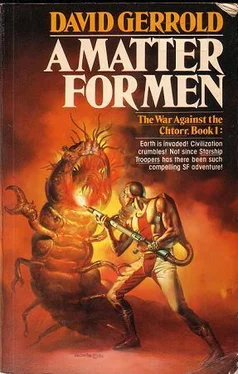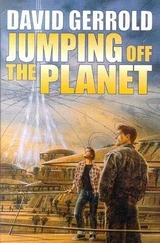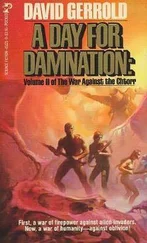David Gerrold - A Matter for Men
Здесь есть возможность читать онлайн «David Gerrold - A Matter for Men» весь текст электронной книги совершенно бесплатно (целиком полную версию без сокращений). В некоторых случаях можно слушать аудио, скачать через торрент в формате fb2 и присутствует краткое содержание. Год выпуска: 1983, Жанр: Боевая фантастика, на английском языке. Описание произведения, (предисловие) а так же отзывы посетителей доступны на портале библиотеки ЛибКат.
- Название:A Matter for Men
- Автор:
- Жанр:
- Год:1983
- ISBN:нет данных
- Рейтинг книги:4 / 5. Голосов: 1
-
Избранное:Добавить в избранное
- Отзывы:
-
Ваша оценка:
- 80
- 1
- 2
- 3
- 4
- 5
A Matter for Men: краткое содержание, описание и аннотация
Предлагаем к чтению аннотацию, описание, краткое содержание или предисловие (зависит от того, что написал сам автор книги «A Matter for Men»). Если вы не нашли необходимую информацию о книге — напишите в комментариях, мы постараемся отыскать её.
A Matter for Men — читать онлайн бесплатно полную книгу (весь текст) целиком
Ниже представлен текст книги, разбитый по страницам. Система сохранения места последней прочитанной страницы, позволяет с удобством читать онлайн бесплатно книгу «A Matter for Men», без необходимости каждый раз заново искать на чём Вы остановились. Поставьте закладку, и сможете в любой момент перейти на страницу, на которой закончили чтение.
Интервал:
Закладка:
He stopped and laid down his knife. He wiped the blood off his gloves. "It is impossible to work in weather like this." His breath was frosty in the air. "And I can't get a grip through these gloves. No, I didn't know-and yes, it was good planning. But it wasn't my idea. It was your grandfather's. I wish you could have known him better. He used to tell me that a man should be prepared to move suddenly at least three times in his life. That is, if you're planning to live a long life. You know why, of course. Pick any period of history, any place. It's hard to find seventy years of unbroken peace and quiet. Somebody's tree is always too crowded." He sighed. "When the screeching starts, it's time to go someplace quieter." He picked up the knife and went back to his evisceration of the buck. "Our family has a history of narrow escapes-wait a minute. Hold that-ah, there! One of your great-grandfathers left Nazi Germany in 1935. He kept heading west until he got to Dublin-that's why your name is McCarthy today. He forgot to marry your great-grandmother in a church."
"Oh," I said.
"Your grandfather bought this land in 1986. When land was still cheap. He put a prefab on it. Came up here every summer after that and built a little more. Never saw the sense of it myself until-let's see, it was before you were born-it would have had to have been the summer of '97. Right, we thought that was going to be the year of the Apocalypse."
"I know," I said. "We studied it in school."
He shook his head. "It's not the same, Jim. It was a terrifying time. The world was paralyzed, waiting to see if they would drop any more bombs. We were all sure that this was it-the big one. The panics were pretty bad, but we came through it all right, up here. We spent the whole year on this mountain-didn't come down till Christmas. The world was lucky that time. Anyway, that's what convinced me."
We began pulling the buck around and onto the sled. I said, "How long do you think we'll have to stay up here this time?" "Dunno. Could be a while-maybe even a couple years. In the fourteenth century, the Black Death took its time about dying out. I don't expect these plagues to be any different."
I thought about that. "What do you think we'll find when we do go back?"
"Depends."
"On?"
"On how many people have... survived. And who." He looked at me speculatively. "I think you'd better start listening to the radio with me again."
"Yes, sir."
About a month after that, we caught a broadcast out of Denver, the provisional capital of the United States. Martial law was still in effect. The thirty-six surviving members of Congress had reconvened and postponed the presidential election for at least six months. And the second-generation vaccines were proving nearly sixty percent effective. Supplies were still limited though.
Dad and I looked at each other and we were both thinking the same thing. The worst is over.
Within a month, Denver was on the air twenty-four hours a day. Gradually, the government was putting its pieces back together. And a lot of information was finally coming to light.
The first of the plagues-they knew now there had been several -had appeared as isolated disturbances in the heart of Africa. Within a few weeks, it had spread to Asia and India and was beginning its westward sweep across the world. The second plague came so hard on its heels that it seemed like part of the same wave, but it had started somewhere in Brazil, I think, and swept north through Central America-so fast, in fact, that many cities succumbed before they even had a chance to identify it. By the time of the third plague, governments were toppling and almost every major city was in a state of martial law. Almost all travel worldwide was at a standstill. You could be shot for trying to get to a hospital. The fourth and fifth plagues hit us like tidal waves, decimating the survivors of the first three. There was a sixth plague too-but by then the population density was so low, it couldn't spread.
Some areas had been lucky and had remained completely unaffected, mostly isolated out-of-the-way places. A lot of ships just stayed at sea, particularly Navy vessels, once the admiralty recognized the need to preserve at least one military arm relatively intact. Then there were remote islands and mountaintop settlements, religious retreats, survival communities, our entire Nuclear Deterrent Brigade (wherever they were), the two lunar colonies, the L5 construction project (but they lost the ground base), the submarine communities of Atlantis and Nemo and quite a few places where someone had the foresight to go down and blow up the bridge.
But even after the vaccines were in mass production and the plagues had abated (somewhat), there were still problems. In fact, that was when the real problems began. In many parts of the world, there was no food, the distribution systems having broken down completely. And typhus and cholera attacked the weakened survivors. There was little hospital care available anywhere in the world; the hospitals had been the first institutions to go under. (Any doctor who had survived was automatically suspect of dereliction of duty.) Many large cities had become uninhabitable because of fires and mass breakdown of services. Moscow, for instance, was lost to a nuclear meltdown.
It was the end of the world-and it just kept on happening. So many people were dying of exposure, starvation, anomie, suicide, shock and a thousand other things that people didn't usually die of but which had suddenly become fatal, that it seemed we were caught up in a larger plague with no name at all-except its name was despair. The waves of it rolled around the world and kept on rolling and rolling and rolling....
Before the plagues had broken out, there had been almost six billion human beings on the Earth. By the end of it, nobody knew how many were left. The United States government didn't even try to take the next national census. If anybody in authority had any idea how many people had survived, they weren't saying. It was almost as if they were afraid to make it real. But we heard on the short wave one night that there had to be at least a hundred million dead in this country alone. Whole cities had simply ceased to exist.
We couldn't comprehend that, but there were all those reports on the radio and pictures on the TV. Large areas of the countryside were returning to wilderness. There were ruins everywhere. Burned-out houses were commonplace-frightened neighbors had tried to halt the spread of the disease by burning the homes of the dying, sometimes not even waiting until the dying were dead. Everywhere there were abandoned cars, broken windows, faded billboards, uncut lawns and more than a few mummified corpses. "If you come upon one," said the voice from Denver, "exhale quickly, don't inhale, hold your breath, don't touch anything and back away-practice it till it becomes a reflex. Then place yourself in quarantine-there may be a chance for you, maybe-and call a decontamination squad. If you're in a place where there are no decontamination units, set a fire. And pray you've been fast enough."
We stayed up in the mountains through spring. And listened to the radio.
Denver reported that it looked like the plagues were beginning to die out. There were less than a thousand outbreaks a week worldwide, but people were still dying. There were famines now -there were crops that hadn't been planted-and mass suicides too. If the plague without a name had been despair before, then now it was madness. People slipped into and out of it so easily it was recognized as a fact of life-a complaint so common that no one was untouched, so universal it became transparent. Like air, we couldn't see it anymore, but nonetheless we were enveloped in it every moment of existence.
The news reported only the most shocking or disturbing cases, the ones too big to ignore. We listened, wondered and sometimes cried. But there was just too much hurt to handle. Most of it we buried. And some of it we didn't-we just avoided it the best we could. Somehow we managed not to care too much. Somehow we managed to survive.
Читать дальшеИнтервал:
Закладка:
Похожие книги на «A Matter for Men»
Представляем Вашему вниманию похожие книги на «A Matter for Men» списком для выбора. Мы отобрали схожую по названию и смыслу литературу в надежде предоставить читателям больше вариантов отыскать новые, интересные, ещё непрочитанные произведения.
Обсуждение, отзывы о книге «A Matter for Men» и просто собственные мнения читателей. Оставьте ваши комментарии, напишите, что Вы думаете о произведении, его смысле или главных героях. Укажите что конкретно понравилось, а что нет, и почему Вы так считаете.












